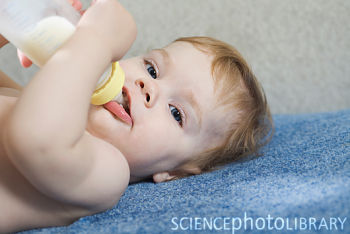导读:有些妈妈倾向在婴儿表现出进食需求时才喂奶,这样做好吗?英国的一项新研究显示,按需求喂奶的一些孩子长大后智商测试的分值较高,其上学后成绩较好。

按需求喂奶的孩子智商较高
有些妈妈倾向在婴儿表现出进食需求时才喂奶,这样做好吗?英国的一项新研究显示,按需求喂奶的一些孩子长大后智商测试的分值较高,其上学后成绩较好。
英国埃塞克斯大学等机构的研究人员在新一期《欧洲公共卫生期刊》上报告说,他们调研了1万多名在上世纪90年代出生的孩子。分析结果显示,那些小时候按需求喂奶的孩子,在8岁时的智商测试结果比定时喂奶的孩子平均高出4到5分,前者在学校里的考试成绩也较好,这种特点可一直体现到前者14岁时的考试成绩中。
研究人员玛丽亚·亚科武说,无论是母乳喂养的孩子,还是用奶粉喂养的孩子,在统计中都有随喂奶方式不同而出现的某种类似差别。她指出,若要形象地认识这个差别,可以想象一个有30名孩子的班级,如果一名孩子成绩中等,排在第15名,智商上升四五分后,其名次可能会提高到第12名或第11名。
不过她也强调说,本次研究只是揭示了一种联系,现在还不能解释喂奶方式与智商相关的内在机制,因此还不能在因果关系上急于下结论,还需更多研究来帮助分析上述差别背后的原因。

 wellbeing and children’s cognitive development
wellbeing and children’s cognitive development
Maria Iacovou and Almudena Sevilla
Background: Many popular childcare books recommend feeding babies to a schedule, but no large-scale study has ever examined the effects of schedule-feeding. Here, we examine the relationship between feeding infants to a schedule and two sets of outcomes: mothers’ wellbeing, and children’s longer-term cognitive and academic development. Methods: We used a sample of 10 419 children from the Avon Longitudinal Study of Parents and Children, a cohort study of children born in the 1990s in Bristol, UK. Outcomes were compared by whether babies were fed to a schedule at 4 weeks. Maternal wellbeing indicators include measures of sleep sufficiency, maternal confidence and depression, collected when babies were between 8 weeks and 33 months. Children’s outcomes were measured by standardized tests at ages 5, 7, 11 and 14, and by IQ tests at age 8. Results: Mothers who fed to a schedule scored more favourably on all wellbeing measures except depression. However, schedule-fed babies went on to do less well academically than their demand-fed counterparts. After controlling for a wide range of confounders, schedule-fed babies performed around 17% of a standard deviation below demand-fed babies in standardized tests at all ages, and 4 points lower in IQ tests at age 8 years. Conclusions: Feeding infants to a schedule is associated with higher levels of maternal wellbeing, but with poorer cognitive and academic outcomes for children.







